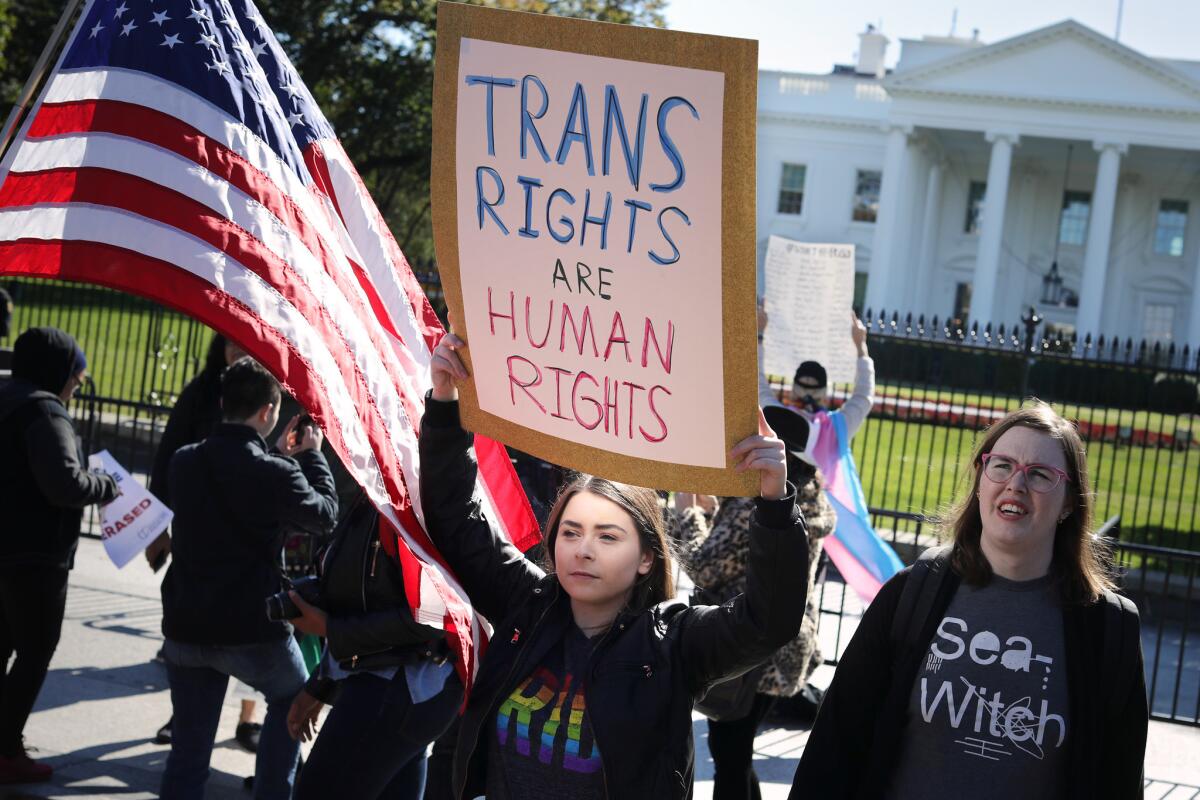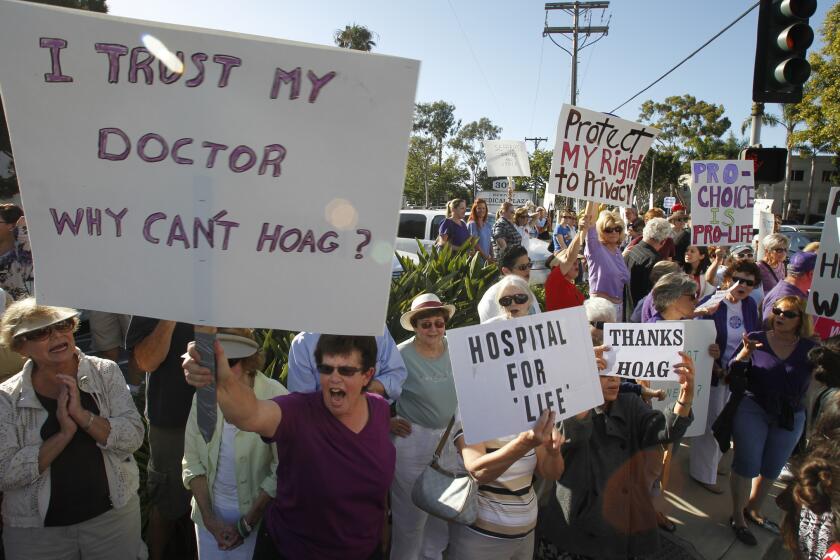Court reinstates lawsuit against Catholic hospital for refusing transgender patient’s surgery

- Share via
Stating that California’s interest in fighting discrimination against LGBTQ residents outweighs the right to impose religious standards on healthcare, an appeals court has reinstated a lawsuit against the Catholic hospital chain Dignity Health for barring a hysterectomy for a transgender patient.
The lawsuit was brought by Evan Minton, whose hysterectomy was abruptly canceled by Dignity’s Mercy San Juan Medical Center of Carmichael, Calif., in 2016 when hospital officials learned he was transgender. The hospital took the action to comply with the church’s Ethical and Religious Directives for Catholic Health Care Services, which prohibit sterilization procedures except in very narrow circumstances.
“Any burden [state law] places on the exercise of religion is justified by California’s compelling interest in ensuring full and equal access to medical treatment for all its residents,” wrote Justice Stuart R. Pollak for a unanimous three-judge panel of the state Court of Appeal in San Francisco.
‘Full and equal’ access requires avoiding discrimination, not merely remedying it after it has occurred.
— California Court of Appeal
The appellate decision was handed down late Tuesday. The decision returns the case to San Francisco County Superior Court, which had dismissed it, for further proceedings and trial.
The ruling could narrow the ability of Catholic hospitals in California to place limits on the healthcare it delivers to patients. The Ethical and Religious Directives forbid a host of procedures associated with women’s reproductive rights, treatments for transgender patients and end-of-life care.
The document describes “abortion, euthanasia, assisted suicide and direct sterilization” as “intrinsically evil” and bars administrators and employees of Catholic hospitals from assisting or even making referrals for patients seeking those procedures. Departures from the directives, such as when an abortion is necessary to save the life of the mother, must be approved by local bishops.
Not all Dignity institutions are designated as “Catholic hospitals” subject to the directives, but its so-called non-Catholic hospitals are subject to the slightly less restrictive Statement of Common Values, which also bars abortions. San Francisco-based Dignity is the largest hospital chain in California and the fifth largest in the nation.
The University of California regents are wrestling with a question that should have an easy answer: Should they approve an “affiliation” between UC San Francisco, one of the leading teaching hospitals in America, and Dignity Health, a Catholic hospital chain that openly discriminates against women and LGBTQ patients and requires its doctors to comply with religious directives, some of which run counter to medical science and ethical practice?
The issue of Dignity’s adherence to the church rules blew up a plan by UC San Francisco, the university’s main medical school, to affiliate with four Dignity hospitals in the Bay Area. The proposal created a furor among UCSF professionals, who questioned whether a public institution could morally or legally collaborate with a hospital chain that openly practices discrimination. UCSF dropped the affiliation plan in May.
The appeals court “confirmed that our state nondiscrimination law, the Unruh Act, requires ‘full and equal’ access, and that doesn’t mean turning a person away from a facility,” says Elizabeth Gill, senior staff attorney for the ACLU of Northern California, which represents Minton. The judges, following precedent set by the state Supreme Court, rejected Dignity’s argument that the Unruh Act doesn’t apply to its hospitals because of its religious affiliation, Gill told me. The ruling confirms that “the Unruh Act does apply even to religiously affiliated businesses that are open to the general public.”
Dignity asserted in a statement issued after the ruling that “our services are available to everyone without discrimination and all are welcome at our care sites. Catholic hospitals do not perform sterilizing procedures such as hysterectomies for any patient regardless of their gender identity, unless there is a serious threat to the life or health of the patient.” The statement observed that “in this case, Mr. Minton was able to quickly receive the sought-after procedure at another nearby Dignity Health hospital that is not Catholic-affiliated.”
Back in 2010, I had an emotional conversation with a woman I am proud to call my closest transgender friend.
The statement added, “Courts have repeatedly recognized the right of faith-based hospitals not to provide services based on their religious principles.”
The appeals court ruled, however, that the backup plan still involved discrimination.
Minton, a former legislative aide in Sacramento, said in his lawsuit that his doctor had scheduled a hysterectomy for Aug. 30, 2016, at Mercy, which is subject to the directives. Minton’s physicians, including two mental health professionals, had concluded that the operation was necessary to treat his gender dysphoria, a condition in which individuals suffer because of a mismatch between their biological sex and their gender identity. The operation was part of Minton’s full transition to male identity.
Two days before the scheduled operation, Minton mentioned to a Mercy nurse that he was transgender. Mercy canceled the operation the next day. According to the lawsuit, the hospital’s president, Brian Ivie, told Minton’s surgeon that she would “never” be permitted to perform the hysterectomy at Mercy because it was scheduled to treat his gender dysphoria.
Minton is seeking a judicial determination that Dignity discriminated against him, an injunction against the chain’s barring hysterectomies for transgender patients or any other discrimination based on gender identity, and $4,000 in damages under the Unruh Act.
Rebecca Chamorro, 33, is a married woman who is due to give birth to her third child by C-section on Jan. 28.
Dignity countered Minton’s lawsuit by asserting that it was protected by its “federal and state constitutional rights of free exercise of religion and freedom of expression,” the appellate decision said.
The hospital chain also asserted that it promptly arranged for Minton’s surgeon to obtain privileges at a non-Catholic Dignity hospital, where she performed the hysterectomy Sept. 2, 2016.
The appellate court ruled that the alternative wasn’t enough to absolve Dignity of the claim of discrimination. Minton alleges that Dignity made the second hospital available only after he and his surgeon “exerted pressure on Dignity Health through the media and political connections.”
As Minton argued at the lower court, “it cannot constitute full equality ... to cancel his procedure for a discriminatory purpose, wait to see if his doctor complains, and only then attempt to reschedule the procedure at a different hospital.” The appellate court observed that “‘full and equal’ access requires avoiding discrimination, not merely remedying it after it has occurred.”
More to Read
Inside the business of entertainment
The Wide Shot brings you news, analysis and insights on everything from streaming wars to production — and what it all means for the future.
You may occasionally receive promotional content from the Los Angeles Times.












